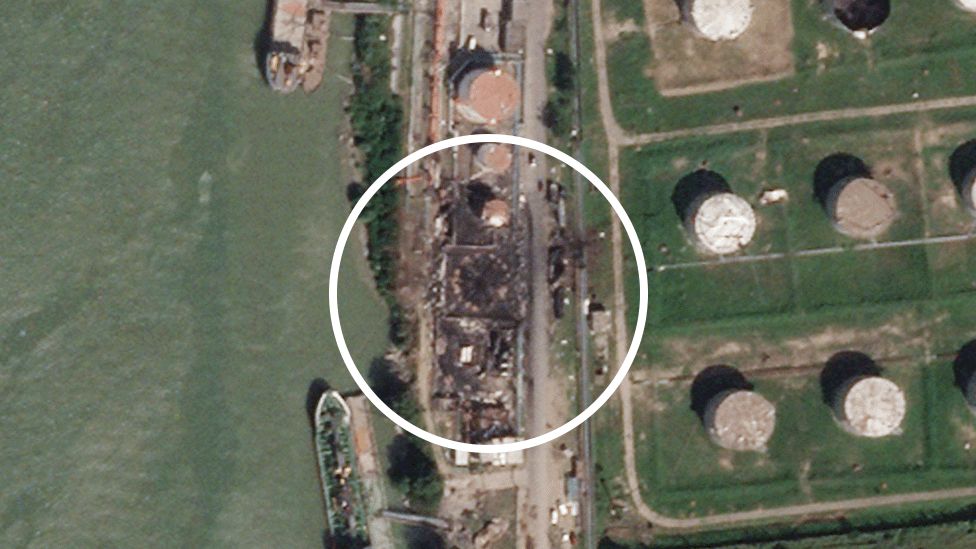Satellite images reveal damage to Ukraine grain ports
- Published

Damage to Reni port on the Danube can be seen on satellite images
Since refusing to renew the deal allowing Ukraine to export grain across the Black Sea, Russia has repeatedly targeted alternative export routes along the River Danube.
Turkish President Recep Tayyip Erdogan has recently said he is confident that Russia will restart the deal, but President Putin says he wants compromises from the West before ending the Black Sea blockade.
We've looked at what grain infrastructure has been targeted and what this latest escalation means for global trade.
What has been hit?
With its Black Sea ports now effectively blockaded by Russia, Ukraine is having to rely heavily on its ports along the Danube to export grain into neighbouring Romania.
From there, it can be travel along the river to Romania's Black Sea ports, and be shipped further afield.
After repeatedly targeting Ukraine's export hubs on the Black Sea, Russia has turned its missiles and drones on Danube ports, such as Reni and Izmail.
Recent satellite images of Reni port reveal that Russian attacks at the start of September have caused extensive damage to what look like grain silos at the facility.
This follows earlier strikes in July and August on silos, hangars and other buildings at the port.
The port of Izmail, further to the east, has also been struck repeatedly in drone attacks as has the Zatoka bridge - a key link which allows grain trucks into Izmail by road.
On 7 September an attack on Izmail lasted three hours, according to the local governor, external - hitting grain storage and loading infrastructure and other buildings.
Satellite images from July show extensive damage to infrastructure at the Black Sea port of Chornomorsk, where at least two storage tanks appear to have been hit.
Ukrainian authorities say that 60,000 tons of agricultural products were destroyed at the site, external.
There have been several recent attacks on the city of Odesa, but these strikes don't seem to have disrupted grain trade, and in recent satellite images we've analysed, its port facilities appear to have remained unscathed.
Further south, in areas where Ukraine uses other export routes that bypass its own Black Sea ports, the damage has been more extensive.
How has this impacted exports?
The River Danube is now the main route for Ukraine's grain exports, shipped along the river into neighbouring Romania and sent onwards via that country's Black Sea ports like Constanta.
The Ukrainian authorities say more than 270,000 tonnes of grain have been destroyed by recent Russian attacks on Danube ports.
The attacks at Izmail port have caused extensive damage to grain facilities
"Freight rates for shipments from Izmail to Constanta port [in Romania] went up by around 50% from early July to late August," says Andrey Sizov, an expert on the Black Sea agricultural markets.
"The intensity of the most recent attacks could mean these rates would rise even further."
Only a handful of vessels have used the corridor across the Black Sea since the end of the grain initiative, but they weren't carrying grain., external
And using a narrow river corridor means there's a physical limitation on exports, compared with shipments by sea.
"With the grain deal being over, the export of Ukrainian grain will stumble at maximum export capacity by river, trucks and rail to about 2.5 million tonnes per month," says Mariia Bogonos, an agriculture policy expert at the Kyiv School of Economics.
Attacks in August temporarily closed the Danube port of Reni, but ports on the river did appear to resume normal operations afterwards.
However, the targeting of these ports means shipping and insurance costs are rising.
Romania has said that said it would look to enhance other routes via road and rail for Ukraine's grain exports.
Ukraine has also started using Croatian ports to export some grain, according to Deputy Prime Minister Yulia Svyrydenko. However, she didn't make clear how much was going via this route. , external
Additional reporting by Tural Ahmedzade, Paul Brown, Joshua Cheetham, Filipa Silverio, Benedict Garman and Alex Murray.